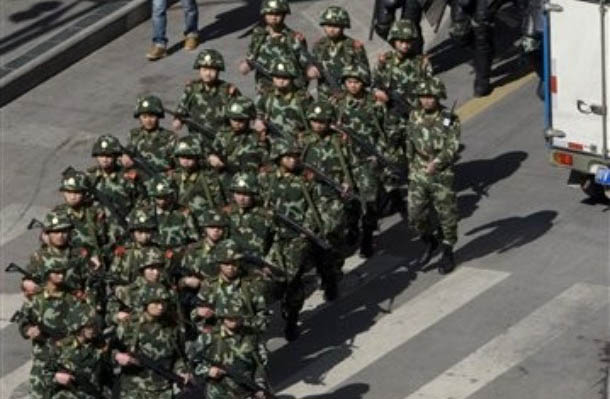 Dharamsala: Tsering, a Tibetan researcher and monk from the Kirti monastery, eastern Tibet recounted his experiencesin Tibet during the nationwide unrest last March with a gathering of foreigners in Dharamsala, India yesterday: "I spent the first 19 years of my life in Tibet. Last year I collected information regarding the March protests in Ngaba county, eastern Tibet, my native region. After the 10th of March, larger protests ensued; the most prevalent took place on the 14th of March. On the 7th of February, one monk burned himself alive.
Dharamsala: Tsering, a Tibetan researcher and monk from the Kirti monastery, eastern Tibet recounted his experiencesin Tibet during the nationwide unrest last March with a gathering of foreigners in Dharamsala, India yesterday: "I spent the first 19 years of my life in Tibet. Last year I collected information regarding the March protests in Ngaba county, eastern Tibet, my native region. After the 10th of March, larger protests ensued; the most prevalent took place on the 14th of March. On the 7th of February, one monk burned himself alive.
The Chinese military fired two guns. We do not know if he is alive or dead. Since that time, the army has used guns to contain peaceful demonstrations. Why do we protest? In 1949, the Chinese communist regime occupied our nation. The government has retold Tibetan history to suit its own purposes. We are encircled by propaganda. Many of our traditions have been lost. Tibetan people lack the freedom of speech and expression. We cannot practice our religion to the fullest extent, as it is illegal to own photographs of His Holiness the Dalai Lama in Tibet.
The Tibetan people harbor deep inner pain. After China's occupation of Tibet, one million people died, the majority during the Cultural Revolution. Last year we struggled for more than our freedom. We fought for sovereignty with our brothers and sisters who have perished in the last 50 years. The Olympic Games posed an opportunity for us to express ourselves with the entire world as witness. Last year was special because the demonstrations overtook the whole of Tibet. They began in Lhasa and spread throughout the country. Every person of every region had his own personal reason for risking his life. This was not a chain-reaction. It was spontaneous; there were no leaders. One of the slogans was: 'His Holiness Needs Tibet to be His Home.'
Twenty-three people were killed in Ngaba County on the 16th of March 2008. Some died in their homes a few days afterward; others succumbed to fatal injuries in Chinese prison-camps. Following the series of protests, the Chinese government ordered hospitals to refuse treatment to all Tibetans. Every monastery and school was monitored by the Chinese military. Monks and nuns were restricted access to water and fruit for 2 or 3 months. Farmers could not farm, students could not study. Our villages resembled war-zones. On the 22nd and 23rd of March, the army searched Buddhist monasteries for weapons and confiscated and destroyed 13,000 photographs of His Holiness the Dalai Lama.
The Chinese Constitution guarantees all citizens the freedom to practice religion but, in effect, we have none. Three hundred monks were arrested during those two days. Seventy people were sentenced, some to life in prison, others to 7 to 15 years. Every Tibetan was suffering. The Chinese government forcefully subjected them to "patriotic reeducation." We were instructed to love the political system and to denounce our spiritual leader. We were losing our brothers, cousins, friends; 3 people committed suicide. Security cameras have been installed in monasteries.
Religious ceremonies have been banned. A significant number of people have escaped to the mountains to live in caves and practice Buddhism freely. On the 28th of April 2008, a Tibetan school catering to 403 students was closed down because the government claimed that the teachers were preaching "separatism." The headmaster of the school was not politically active; although it had been established by the Kirti Monastery, it was run by the village administrators. A monk must obtain government permission to teach Buddhism in a monastery. When one high Lama in my region gained widespread support, his license was revoked. Police security stains every official religious ceremony.
Given the repression and suffocating Chinese influence, we feed our passion for freedom while struggling to keep our culture alive."


![Tibet has a rich history as a sovereign nation until the 1950s when it was invaded by China. [Photo: File]](/images/stories/Pics-2024/March/Tibet-Nation-1940s.jpg#joomlaImage://local-images/stories/Pics-2024/March/Tibet-Nation-1940s.jpg?width=1489&height=878)















